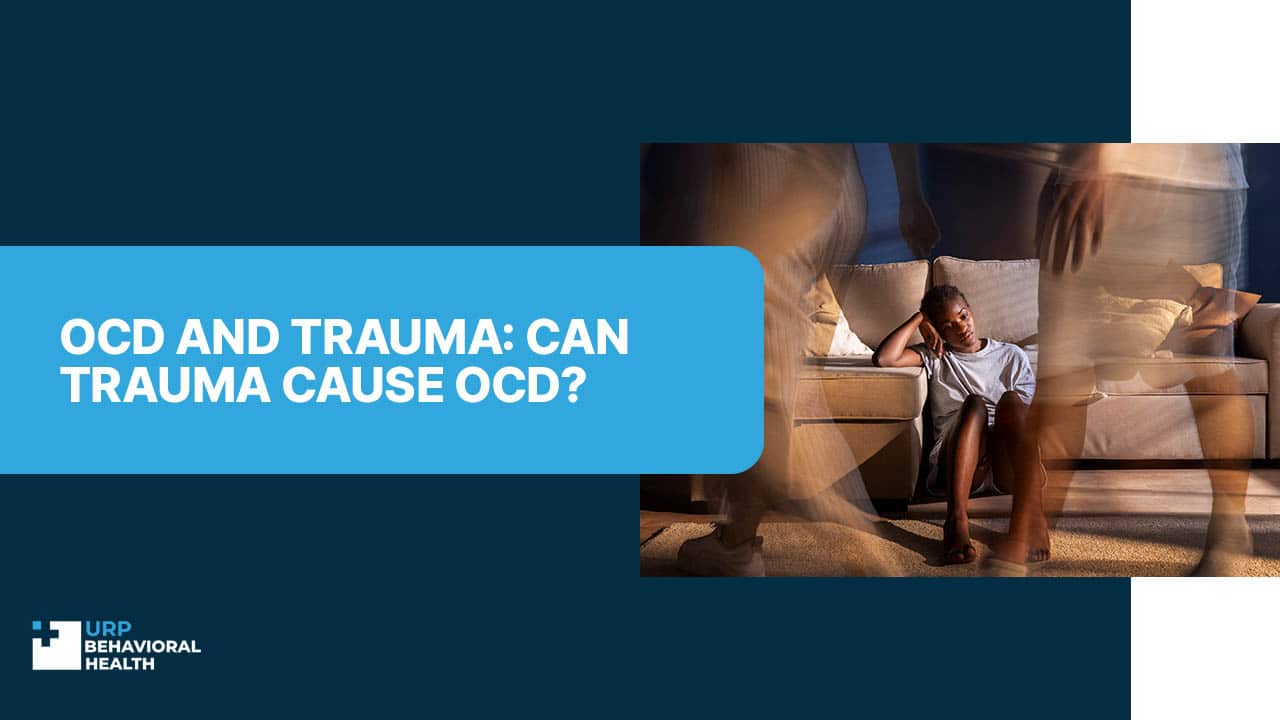
OCD and Trauma: Can Trauma Cause OCD?
Obsessive-compulsive disorder (OCD) is a mental condition characterized by specific behavior patterns of the sufferers. They experience intrusive thoughts (obsessions), which cause distress. It can be fears of germs or disease, intrusive thoughts of harming loved ones, doubts about past actions, desires to achieve symmetry or order in something, etc. These obsessions might only be relieved by performing repeated rituals (compulsions). These symptoms place an OCD person into a vicious circle of unwanted thoughts and attempts to handle them. This mental illness significantly affects all life aspects of sufferers. [1]
The Connection Between Trauma and OCD
The exact origin of OCD is unknown. Scientists connect it with genetic, biological, and psychological factors. One more of the possible reasons causing the condition is trauma. Usually experienced in childhood, it may provoke triggers in people with genetic or neurobiological proneness to anxiety or obsessive thinking. However, the link between OCD and trauma is even more profound, as they share some neurological mechanisms. Both conditions involve hyperactivity in the amygdala and prefrontal cortex. These brain parts regulate fear, decision-making, and emotional regulation. [2]
There is also a connection between OCD and post-traumatic stress disorder (PTSD). Every third PTSD patient experiences OCD symptoms. In this case, there are shared maladaptive behaviors to cope with distress. It’s an obsession-compulsion circle for OCD and a similar mechanism for PTSD. People with it suffer from intrusive memories of trauma, which they can try to handle with avoidance or hypervigilance. [3]
Reach out today and let us create a treatment plan designed around your needs.
Can People Develop OCD From Trauma?
One could wonder, can OCD be caused by trauma? There is no simple answer. Trauma is a significant risk amplifier for OCD, but not the only cause of it, though. This risk increases for the following reasons:
- Pre-existing anxiety or depression. It’s an essential factor in OCD development when experiencing trauma.
- Trauma severity. The more severe or prolonged the trauma, the higher the risk of the condition occurring. It also influences the intensity of symptoms.
- Genetic predisposition. Genetic vulnerabilities heighten susceptibility to trauma-triggered OCD.
- OCD usually develops in adolescence, which makes people in their life period the most vulnerable. The risks increase if youngsters get traumatized.
- Substance use. Coping with trauma may include using stimulants, which can lead to OCD. [4]
How Does Trauma Cause OCD?
But how does trauma cause OCD? The exact mechanism is not completely clear. Scientists assume the negative emotions from trauma can stimulate the production of stress hormones, unset neurotransmitter balance, and impair the natural connections between neural networks in the brain. That can lead to OCD development. Different trauma types can be associated with specific condition themes:
- Physical or emotional abuse can cause contamination, harm, or aggressive obsessions.
- Sexual trauma might result in sexual or religious guilt-based obsessions.
- Accidents can lead to safety-checking compulsions (locking doors, etc). [5]
Our team will verify your insurance and design a plan tailored to your needs.
How Trauma-Related OCD Manifests?
Trauma-related OCD is a distinct subtype of the condition triggered by traumatic experiences. Obsessions and compulsions here are directly or symbolically tied to the trauma. People with OCD caused by trauma can fear reliving the traumatic experience. It influences their mindset and lifestyle. The differences between this condition from classic obsessive-compulsive disorder are the following:
- Thematic obsessions linked to trauma. For instance, it can be unwanted thoughts about harm, violence, or taboo sexual acts mirroring the trauma. Similarly, accidents involving bodily fluids might trigger excessive washing rituals. Trauma linked to financial bankruptcy or poorness can result in compulsive hoarding as a coping mechanism.
- Avoidance behaviors. Unlike the traditional condition, OCD occurring after trauma frequently includes avoidance of its reminders in addition to compulsions. Fear of driving after a car accident is a good example of it. Such behavior increases anxiety, worsens life quality, and can strengthen social isolation.
- Severe and complex symptoms. Sufferers with OCD from trauma usually have higher risks of self-mutilation, depression, and suicidal thoughts. [6]
Treatment Options
Trauma-induced OCD requires treatment that considers both conditions. It includes therapies, medications, and integrated approaches. They often combine techniques addressing both OCD mechanisms and underlying trauma.
- Exposure and response prevention (ERP). It’s a first-line approach for OCD descended from cognitive processing therapy. It includes controlled exposure to anxiety triggers while resisting compulsions. ERP shows effectiveness in OCD treatment.
- Trauma-focused therapies, such as cognitive processing therapy (CPT). It handles trauma-related cognitive distortions, like self-blame, that fuel OCD symptoms.
- Integrated CBT Trauma-informed CBT combines ERP with approaches to treat dysfunctional beliefs stemming from trauma.
- SSRIs (e.g., sertraline, fluoxetine) are among the main drugs for OCD patients. They aim to regulate serotonin to reduce anxiety and intrusive thoughts. [4]
- Deep brain stimulation (DBS) and transcranial magnetic stimulation (TMS). These techniques are for severe cases. They are non-invasive brain stimulations targeting brain regions involved in OCD and trauma responses. [7]
OCD itself is a severe mental condition. But things get worse when it’s trauma-related. OCD symptoms often correlate with trauma in this type of disorder. It requires a practical, tailored approach suitable for both trauma treatment and OCD. If you suffer from trauma aftermath with an effect on your physical and mental health, contact our specialists from URP Behavioral Health.
Contact our admissions team now to begin your path toward a brighter future.
References:
- Cody Abramson. Can Trauma Make People More Susceptible to OCD? https://www.treatmyocd.com/what-is-ocd/info/related-symptoms-conditions/trauma-and-ocd. Mar 24, 2023
- Khiron Clinics. Untangling the Knots: The Intricate Connection Between Trauma and OCD. https://khironclinics.com/blog/untangling-the-knots-the-intricate-connection-between-trauma-and-ocd/. Jun 2, 2023
- By Matthew Tull, PhD. The Link Between PTSD and OCD. https://www.verywellmind.com/trauma-ptsd-and-ocd-2797516. Jan 3, 2023
- Cody Abramson. Can Trauma Make People More Susceptible to OCD? https://www.treatmyocd.com/what-is-ocd/info/related-symptoms-conditions/trauma-and-ocd. Mar 24, 2023
- Keitaro Murayama, Tomohiro Nakao, Aikana Ohno, Sae Tsuruta, Hirofumi Tomiyama, Suguru Hasuzawa, Taro Mizobe, Kenta Kato, Shigenobu Kanba. Impacts of Stressful Life Events and Traumatic Experiences on Onset of Obsessive-Compulsive Disorder. https://pmc.ncbi.nlm.nih.gov/articles/PMC7744562/. Dec 3, 2020
- Florida Medical Clinic. The Relationship Between PTSD and OCD. https://www.floridamedicalclinic.com/fmcmindbody/the-relationship-between-ptsd-and-ocd/
- Eda Gorbis, Alexander Gorbis, and Aanya Jajoo. Clinical Insights into PTSD and OCD Comorbidity. https://www.scivisionpub.com/pdfs/clinical-insights-into-ptsd-and-ocd-comorbidity-3512.pdf. Oct 6, 2024
















